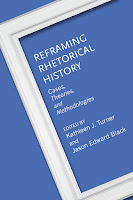Below is a list of publications from 2022-2023. To see Dr. Johnson's complete CV, please click here.
JOURNALS:
Read the essay here
(with Damariye L. Smith) “Creating Purpose, Power, and Passion: Sister Souljah and the Rhetoric of Hip Hop.” Journal of Contemporary Rhetoric. Vol. 12, No. 2, (2022), 45-51
This article introduces a special issue of the Journal of Contemporary Rhetoric addressing the rhetoric of Hip Hop. The essays that follow address a wide range of salient issues, showcasing both how scholars of rhetoric contribute to a richer understanding of Hip Hop and rhetoric and how Hip Hop helps to shape our understanding of rhetoric.
(with Damariye L. Smith) “Creating Purpose, Power, and Passion: Sister Souljah and the Rhetoric of Hip Hop.” Journal of Contemporary Rhetoric. Vol. 12, No. 2, (2022), 45-51
Read the essay here.
BOOK CHAPTERS:
My God is Black, My God is Female”: Rhetoric, Race, and the Spirituality of Black Lives Matter,” in Moved by the Spirit: Religion and the Movement for Black Lives. Christophe Ringer Teresa Smallwood (eds). Lexington Books, (2023)
In this chapter, I examine how supporters of Black Lives Matter appropriate their own understanding of faith and spirituality to describe their involvement with the movement. In short, I discuss how participants say that their faith, religion, or spirituality led them to support #BlackLivesMatter both online and “out in the streets.” I do this by offering an examination of one of the participants’ understanding of God and how that understanding led her to join this movement.
Read the chapter here.
“To Wake Up the Latent Powers”: Henry McNeal Turner and the Legacy of the Israel AME Lyceum. Reframing Rhetorical History: Cases, Theories, and Methodologies. University of Alabama Press, Kathleen J. Turner and Jason Edward Black, eds. (2022), 151-171
In this essay, I bring attention to this particular institution—the Israel AME Lyceum—and its founder, Henry McNeal Turner. Instead of a traditional rhetorical history where I would “offer insights that are central to the study of communication and unavailable through other approaches,” this is more of a recovery project of a rhetorical institution. While I attempt to engage in this recovery project, I do it with the understanding that I have limited access to the history of this institution. Although we know that the Israel AME Lyceum existed, like many “absent archives” there is no written history of the organization. Therefore, there are no significant studies about the institution, and thus, what was said, and how it was said; full extant speeches and debates are lost to history. I find myself echoing Melbourne Cummings as she notes in her essay on the problems of researching Black rhetoric: “some of the greatest and most representative speeches were made without even a partial manuscript that could attest to the speaker's subject, the speech's motivational appeal, [and] what part it or the speaker played in influencing action or other people.” While sources for the study of African American rhetoric and public address have become more available since Cummings' writing in 1972, a recovery project like this one reminds us that there is still much discovery left to do.
Read the chapter here.
“Further Silence Upon Our Part Would be an Outrage”: Bishop Henry McNeal Turner and the Colored Convention Movement” in, The Colored Conventions Movement: Black Organizing in the Nineteenth Century Gabrielle Foreman, Jim Casey, and Sarah Lynn Patterson (eds). Duke University Press, 2021
In this chapter, I examine Turner’s role in the colored convention movement. As I demonstrate, Turner had always been part of and played significant roles in national, state, and local conventions. The 1893 national colored convention held in Cincinnati from November 28 to December 2 is one of the very last, if not the last, to claim that title; it is the focus of the essay. I examine Turner’s role as the president of the convention, analyze his keynote address, and posit why Turner believed that a national colored convention would be the best medium to again advocate for emigration.
Read the chapter here.
EDITED SPECIAL ISSUES:
(with Damariye L. Smith) Creating Purpose, Power, and Passion: Understanding the Rhetoric of Hip Hop. Journal of Contemporary Rhetoric (2022)
Read the issue here.






